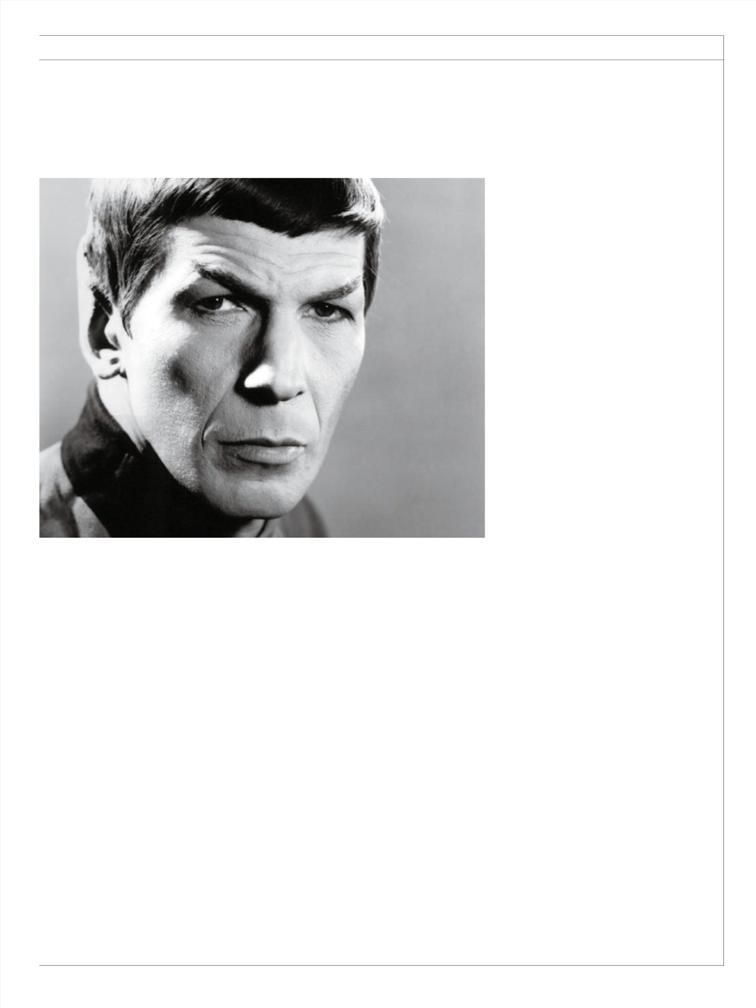
3 minute read
❘ Milestones
A Most Human Alien How Leonard Nimoy went boldly into our hearts
By James Poniewozik
Advertisement
asanactingchallenge,mr.spock was—to borrow an adjective from the Enterprise’s science officer himself—a curious one: a central figure in a drama whose chief characteristic was not showing emotion. And yet he became the character that Star Trek’s audience loved most of all. That owes much to his creator, Gene Roddenberry, of course, but also to Leonard Nimoy, who died Feb.27 at age83, and who invested in Spock every ounce of his own humanity.
Though Spock was the embodiment of logic—the counterweight to swaggery Captain Kirk and hotheaded Bones McCoy—Nimoy felt a spiritual, mystical bond to the alien character. Nimoy created Spock’s signal gesture, the Vulcan salute, from the Jewish priestly gesture that represented the letter shin and thus Shaddai, or the name of the Almighty. (Nimoy was born to Orthodox parents in Boston and witnessed the blessing as a child.)
This choice meant a lot: in the hands of another actor, Spock’s rigid reserve might have played as an absence—the cold nothingness of logic in place of a human heart. As Nimoy interpreted it, it was a presence, the suggestion of greater currents of wisdom beyond the electrical jolts our hearts and brains pump out.
Combined with Nimoy’s mellifluous voice and wry stage presence, this gave Spock a kind of hipster Beat-poetry character that was oddly in step with the times in the fiery, spiritually questing ’60s. The idea of subordinating one’s passions to the larger universe is a spiritual
Nimoy, as Spock in 1968, embraced his character and reprised him many times
idea that goes beyond any particular religion, even beyond religion itself. Part of the reason Spock’s counsel was so effective was not just his intelligence, loyalty and logic but also his ability to see beyond the ego—the self-subjectivity that drove Kirk—to focus on a larger and more eternal whole. (Or, as he put it in his death scene in the film Star TrekII: The Wrath of Khan: The needs of the many outweigh the needs of the few—“or theone.”)
To say that Spock had no emotion wasn’t true. He was in fact part human, constantly wrestling to keep his emotion in control. This gave drama to his very being, and Nimoy, with his careful cadence, showed how being Spock was a job that required constant mental effort. Watch clips of Star Trek and you quickly see that Nimoy’s performance is in fact full of emotion: there are knowing smiles, rapt pauses of concentration, deliberate speeches that play musically like prayers. What Nimoy did was to strip his performance not of emotion but of feelings— the little flailings of affect that most actors (and nonactors) rely on.
The cliché is to say that this made Spock more human than any of us, but again, he was partly human in ancestry. He occupied a space between us and the purely alien, giving us perspective on ourselves. That job, honestly, probably required an actor who was a bit of an eccentric, in the best, unashamed way; beyond his acting work, Nimoy recorded music and spoken-word albums, took photographs and composed free-verse poetry. Artistically, he was an explorer.
Many actors who become so wholly identified with single characters spend a lifetime running away from them. Not Nimoy, who embraced Spock (and reprised him many times) and welcomed the hold the character had on generations. And why shouldn’t he have? In his quizzical alien, he created something bigger than himself—a figure of friendship, mindfulness and understanding that, long after Leonard Nimoy is gone, will keep spreading ripples across theuniverse. ■










